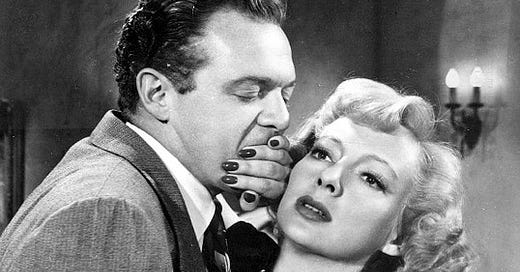The Prowler (1951) is a very weird movie.
Like many of my favorite Film Noirs, none of the main characters are really good and there is no happy ending. What distinguishes this nasty Noir is its depiction of an officer of the law as a disturbed and disturbing intruder.
The movie opens with a POV shot through a bathroom window of a woman draped only in a towel, spied upon by an unseen person. She spots the peeper and screams. Roll credits.
A pair of policemen respond to her call. One of them, Webb Garwood (Van Heflin) is clearly attracted to Susan Gilvray, a married woman (Evelyn Keyes). Something not quite right about Webb, however. He returns alone later that night, insinuating himself into Susan's life. He reveals himself as a bitter, former star athlete who hates his job and his place in life. He's a boorish, manipulative jerk who tries to force himself on Susan.
Susan, however, is not in a happy marriage. She is wed to an older man who is incapable of getting her pregnant. Eventually, she succumbs to Webb's advances and the two commence an affair. Webb discovers that her husband has a $62,000 life insurance policy and a handgun. He hatches a scheme to kill the husband by staging another prowler intrusion, which draws the husband outside, where Webb shoots him and shoots himself with the husband's gun. He is cleared by an inquest and convinces Susan that the whole thing was just a tragic accident.
The pair marry, Webb quits his job as a policeman, and they open a motel outside of Las Vegas. Everything seems fine until Susan reveals she is four months pregnant. Given that her husband was killed two months earlier, this presents a problem. Her husband was impotent – known to his brother - and she and Webb were supposed to be complete strangers. A birth of a child would potentially expose them to the authorities.
Webb freaks out and decides that the only option is to move to a ghost town in the desert and await the arrival of the child. (?!) Things gradually go wrong, however, and Webb begins to unravel as Susan realizes he killed her husband, a local doctor reports him to the police, and his old police partner shows up in a wild coincidence. Justice is finally delivered to poor old Webb.
Much attention has been focused on Evelyn Keyes in this movie, since it is widely considered her best role and performance. Film Noir historian and activist Eddie Mueller, largely responsible for rescuing The Prowler from oblivion, praises Keyes and believes that the main theme of the movie is her character's need to have a child. But I was mesmerized by Van Heflin's sweaty, creepy, performance as Webb. Early on, he is shown in a small, shabby apartment. The only decoration is a police target paper, full of bullet holes, tacked to his wall. He grimaces and grins as he contemplates his plan to seduce Susan. The whole sequence gives off a real Taxi Driver vibe.
Van Heflin's final moments in the film are also great, as he realizes he is cornered and Susan excoriates him as a scumbag. He genuinely looks like a man who is losing his grip on sanity.
The movie was one of three movies written quickly by blacklisted writer Dalton Trumbo before he was sent off to serve eleven months in prison for contempt of Congress. One of the other movies was Gun Crazy, widely considered one of the greatest Film Noirs. It's no exaggeration to list Trumbo as one of the greatest Hollywood screenwriters ever, as his scripts won two Academy Awards. Like The Prowler and Gun Crazy those were listed under other writers' names originally.
Director Joseph Losey was also a victim of the blacklist. Shortly after filming The Prowler, he left the United States to work in exile. Unlike some victims of the Red Scare, Losey was indeed a member of the Communist Party (Dalton Trumbo, also).
Losey (who directed one of my favorite childhood movies: The Boy with Green Hair) contributes plenty of noirish darkness and shadow, plus unusual camera angles to heighten the psychological drama.
Art director John Hubley was also blacklisted. Fired by Disney Studios for union activism, he went on to numerous successful animation projects in the 1940s before being named by a colleague as pro-communist. Like Trumbo, he found sporadic work under pseudonyms.
I previously asked in another post: Is Film Noir Left-Wing? I couldn't detect any overt progressive themes in The Prowler, despite its left wing director and writer. Most likely, Trumbo viewed this as a potboiler intended to provide quick cash to support his family while he was away in prison. But Webb does begin the movie as a representative of The Law who doesn't really believe in his profession and is quickly ready to subvert his oath.
If it is a potboiler, it's a really good one; highly recommended.




